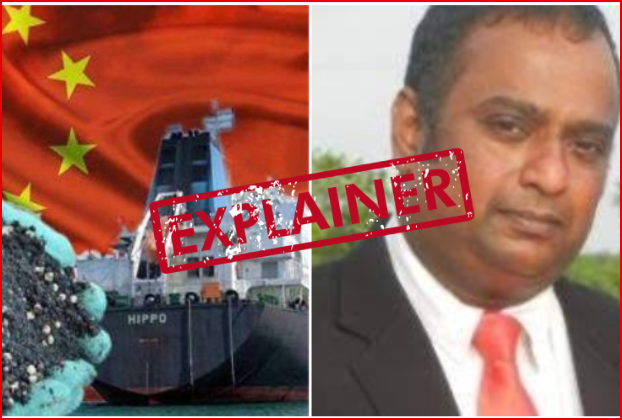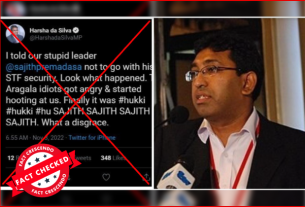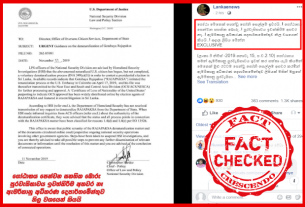
The former president of Sri Lanka, Gotabaya Rajapaksa, continuing on the pre-election mandate, implemented several steps to move towards organic fertilizer. However, this move was not properly phased out and heavily backfired and was one of the reasons for the start of the protests against the Rajapaksa regime.
Under the fertilizer policy, the Rajapaksa government decided to import a massive quantity of organic fertilizer and finally settled the deal with a Chinese firm called Qingdao Seawin Biotech. However, the transaction did not conclude as preliminary tests on samples in Sri Lanka confirmed that the Qingdao fertilizer contained certain harmful micro-organisms that can cause crop failure. Ultimately, this fertilizer ship had to be turned back, causing a massive loss to Sri Lanka, and later escalated even towards diplomatic tension between SL & China.
In the last few days, many FB posts were circulated on social media, which claimed that the CEO of the local agent of Qingdao Seawin Biotech, the infamous Chinese Organic fertilizer company, was, in fact, a candidate contesting for the upcoming local government election under the National People’s Power (NPP) party.
Social Media Posts:
As seen below, WhatsApp and Facebook posts were viral, highlighting that the company’s CEO that brought the Chinese Sewage ship to Sri Lanka, is a Wattala NPP contestant for LP polls.

This is how these posts in the Sinhala language posts were circulated among Facebook users.

Explainer:
To ascertain that the CEO of the company involved in bringing organic fertilizers from China to Sri Lanka is a candidate of the National People’s Party, we first observed which were the local companies involved in this deal and their top management.
The cabinet approved importing 99,000 metric tons of organic fertilizer produced using seaweed from China’s Qingdao Seawin Biotech Group. The consignment was valued at 63.6 million US dollars.
Accordingly, the partner parties for this transaction are China Qingdao Biotech Group Company, its local representative in Sri Lanka, Chelina Capital Corporation (Pvt) Ltd, and Lanka Fertilizer Company Limited, Commercial Fertilizer Company Limited.
If the claim made in the viral social media posts are factual, the Chief Executive Officer (CEO) of Chelina Capital Corporation Pvt. Ltd (local representative of China’s Qingdao Biotech Group) should be Bimal Jayasundara, the NPP candidate.
We first checked the LinkedIn social media account belonging to Bimal Jayasundara. Per his LinkedIn details, Bimal Jayasundara had no executive-level title or acted as a CEO of China’s Qingdao Biotech Group or Chelina Capital Corporation; however, he had worked extensively with many foreign partners, especially in the fertilizer field.

We decided to contact the Chinese Company (Qingdao Biotech Group Company) and their local agent (Chelina Capital Corporation (Pvt) Ltd) to inquire about Bimal Jayasundara’s involvement in this venture.
Chelina Capital Corporation (Pvt) Ltd.
Chelina Capital’s corporate website doesn’t list Mr. Bimal Jayasundara’s name anywhere under its current management.
We contacted Mr. Aravinda Weerasekera, Director of Finance and Administration of Chelina Capital Corporation, to find more details about the involvement of Bimal Jayasundara.
“As Mr. Bimal Jayasundara is a businessman who has connections with China regarding the fertilizer field, he is the one who introduced Qingdao Biotech Group Company to Chelina Capital Corporation,” Mr. Aravinda said. However, he also confirmed that Bimal Jayasundara has never been an executive officer, staffer, or consultant of Chelina Capital Corporation.
Chelina Capital Corporation was assigned to negotiate and connect with Sri Lankan Government and private institutions as the local agent of Qingdao Biotech Group in China.
Below is the exclusive mandate Qingdao Biotech Group sent to Lolitha Abeysinghe, Managing Director of Chelina Capital Corporation Pvt. They confirm the above rights to act on their behalf in Sri Lanka to import organic fertilizer.
http://srilanka.factcrescendo.com/wp-content/uploads/2023/03/Mandate-2021.06.25.pdf
Qingdao Biotech Group Company
We also contacted Qingdao Biotech Group Company and inquired whether Mr. Bimal Jayasundara held any executive rank position in their company. A representative from Qingdao Biotech Group mentioned that although Bimal Jayasundara acted as a consultant, he did not act as a local representative, and Chelina Capital Corporation did the tasks related to the fertilizer importation deal on their behalf.
Accordingly, it is clear that Chelina Capital Corporation Pvt. Ltd. has represented China’s Qingdao Biotech Group Company in Sri Lanka and that Bimal Jayasundara has not held any position as its CEO or any other at this local agent.
Statement by Bimal Jayasundara
Explaining the matter in detail, Mr. Jayasundara said that he is a businessman who has been in the fertilizer industry for a long time and has introduced several foreign partners to local institutions interested in importing fertilizer into Sri Lanka. Therefore, he has contacts with many businessmen in the fertilizer sector in China and other countries.
Commenting on the incident related to the organic fertilizer ship, Mr. Jayasundara says that after the Sri Lankan Government imposed the organic fertilizer policy, the Government called a tender to procure organic fertilizer.
China’s Qingdao Biotech Group, which deals in organic fertilizers worldwide, and another Chinese company expressed interest in this and communicated the same with him. However, Mr. Jayasundara clarified that according to the legal constraints of the tender, there should be a representative agency in Sri Lanka. As a result, with the consent and approval of the two Chinese agencies, he introduced two Sri Lankan agencies to proceed with the bidding process.
Accordingly, China’s Qingdao Biotech Group was introduced to Chelina Capital Corporation Pvt. The other Chinese company was introduced to Brown’s Company.
However, he emphasized that he was not a staff member of either of these local agents.
Jayasundara mentions that there were about twenty-one companies in the government’s bid to import organic fertilizers, out of which only four companies were selected. Among those were the two companies he had introduced.
Mr. Jayasundara also says that because of how the Department of Agriculture handled the procurement process, the other Chinese company JEAT company withdrew from it.
However, the SL government eventually selected Qingdao Biotech Group Company for this organic fertilizer deal. As a result, Chelina Capital Corporation Pvt. Ltd., as its representative in Sri Lanka, took the lead in its future course of action.
“Therefore, throughout the tender procedure, all the decisions or agreements to deal with this Chinese company were dealt with Chelina Capital Corporation, and related government parties and relevant institutions, and I participated in a few discussions at the request of the Chinese company, as he is an expert in the field of fertilizer.” clarified Jayasundara.
Mr. Jayasundara highlights that he did not participate in making decisions in any way, and it was only a decision between the then Government Ministry of Agriculture and the representative body of the Chinese company in Sri Lanka.
He added that Mr. Shashindra Rajapaksa, who was the former Minister of State for Agriculture at that time, also participated in the discussions with these institutions.
“There was a contract to import ninety-nine thousand tons of organic fertilizers to Sri Lanka. They were to be supplied by five ships, and after paying 100% to the first ship, there was an agreement to bring the first fertilizer ship to Sri Lanka. Still, according to a request made by Mr. Shashindra Rajapaksa, 75% was paid before the fertilizer ship left the country, and the remaining 25% came to Sri Lanka. It was also discussed that it would be checked and given later.” adds Bimal Jayasundara.
He also mentions that the shipment was tested according to the criteria given by the Sri Lanka Standards Institute, and a German institute had tested it with proper clearances. After that, “in the test done by the Plant Quarantine Service, it was said that the fertilizer sent to Sri Lanka had 0% good bacteria. He also mentioned that Plant Quarantine Service only mentions that bacteria were suspected.”
He also mentioned that “the fertilizer ship has to leave within eight days from the commencement date of LC as stipulated in the provisions of the letter of credit. Otherwise, a fine will be charged, and the supplier must pay for it, so the fertilizer ship left China.”
Mr. Jayasundara says that China’s Qingdao Biotech Group is a company that exports fertilizers to more than fifty countries, and even though it is banned in Sri Lanka, they sell beneficial bacteria to countries like Australia.
It was mentioned that the ship was kept in Sri Lankan waters for three months, and the reason for this was due to the violation of the agreement and that they left again after the official cancellation of the relevant contract.
Mr. Bimal Jayasundara reiterates that the Chinese company was selected by the then Government led by former President Gotabhaya Rajapaksa, who invited tenders. “But they are running false propaganda as I’m the CEO of the Chinese company and representative agency due to my candidacy from the NPP party,” he further said.
Chinese fertilizer ship
On April 29, 2021, Sri Lankan President Gotabaya Rajapaksa announced plans to make Sri Lanka the world’s first fully organic farming nation. The Government imposed a total ban on agrochemicals. Since Sri Lanka does not manufacture organic fertilizer, it had to import it urgently. Qingdao Seawin won a government contract to supply 99,000 tons of organic fertilizer.
In September 2021, when the ship Hippo Spirit, which carried the first consignment of 20,000 tons, was heading toward Colombo port, Sri Lankan soil scientists found plant pathogens like ‘Erwinia’ in fertilizer samples.
Since applying such fertilizer to the Sri Lankan soil would have severe implications for Sri Lankan biosecurity and impact agriculture for generations, the ship was not permitted to dock at Colombo.
“The unscientific detection method and conclusion” of Sri Lanka’s National Plant Quarantine Service (NPQS) “do not comply with international animal and plant quarantine convention,” Qingdao Seawin said in a statement. In addition, it accused NPQS of “irresponsibly conveying false and even controversial remarks to the media.” The Chinese company also slammed the media for using “derogatory words” like “toxic, garbage, pollution” to describe the fertilizer consignment. This was aimed at “seriously slandering the image of the Chinese enterprises and the Chinese government,” it said.
When a Sri Lankan commercial high court halted payment of $9 million for the fertilizer onboard the Hippo Spirit, the Chinese embassy in Colombo waded into the dispute. It blacklisted Sri Lanka’s state-owned People’s Bank for not paying the company.
In subsequent talks with Sri Lanka’s agriculture ministry, Qingdao Seawin put forward several conditions for resolving the dispute. It said Sri Lanka would have to pay 70 percent of the agreed price in the original tender agreement and additional freight charges. Moreover, the agriculture ministry would have to issue a statement that the shipment was rejected because of an import permit dispute and not because of the quality of the fertilizer. Qingdao Seawin wanted to avoid the controversy over the quality of its shipment to Sri Lanka to impact its trade with over 50 countries, including the US.
How was ‘Qindao Seawin Biotech Group’ selected in the tender?
Mr. Mahesh Gamman Pila, the Additional Secretary to the Government during the presidency of Gotabhaya Rajapaksa, said that the Chinese company was chosen as the company that could supply the entire country out of the four companies selected at the end of the government’s call for bids for organic fertilizers.
That these procurement activities were carried out according to high standards, and if any problems arose in the inspection reports, an appointed independent surveyor would be brought to make the decision again and send the unsuitable stock back to that country, and get a ship of fertilizer of the expected quality before sending to this country. He further mentioned that this procurement had been done on the following conditions.
The Minister of Agriculture, Mr. Mahindananda Aluthgamage, expressed his views regarding finding micro-organisms called ‘Erwinia’ in organic fertilizer samples brought to Sri Lanka from China in a press conference. The minister mentioned that the micro-organisms in question were found in a piece of organic fertilizer brought from China for testing on an unofficial level.
Also, Mr. Mahindananda Aluthgamage, the Minister of Agriculture at that time, had mentioned that the microbes were found in a sample of manure brought by his department through an informal method. He also said that due to the delay in the arrival of the international laboratory report related to this fertilizer, the fertilizer ship was not taken into the port of Sri Lanka for 15 days.
But the Director General of the Department of Agriculture, Dr. Ajanta de Silva, said that after testing a new sample of the fertilizer imported from the Chinese company, it was confirmed that it also contains harmful micro-organisms. He further mentioned that it is impossible to verify whether the new sample contains Erwinia, but it can definitely be said that it contains harmful microbes.
The Chinese ship carrying this cargo of organic fertilizers reached Sri Lankan waters on September 23, 2021. However, a controversial situation was created as non-biodegradable organic fertilizers cannot be brought into the country according to the Plant Quarantine Act. The fertilizer stock was thus not allowed to be brought into the country.
Also, regarding this situation and questioning the tests carried out in Sri Lanka at that time, the Chinese Embassy in Sri Lanka made a statement along with a letter from Qingdao Seawin Biotech Company. Sri Lankan experts had warned that 99,000 metric tons of organic fertilizers imported from China at 12.9 billion rupees contain harmful micro-organisms, and their importation to this country would cause an agricultural disaster.

Title:Explainer on viral claims involving NPP candidate Bimal Jayasundara and Chinese Organic Fertilizer deal!
Fact Check By: Pavithra SandamaliResult: Explainer





